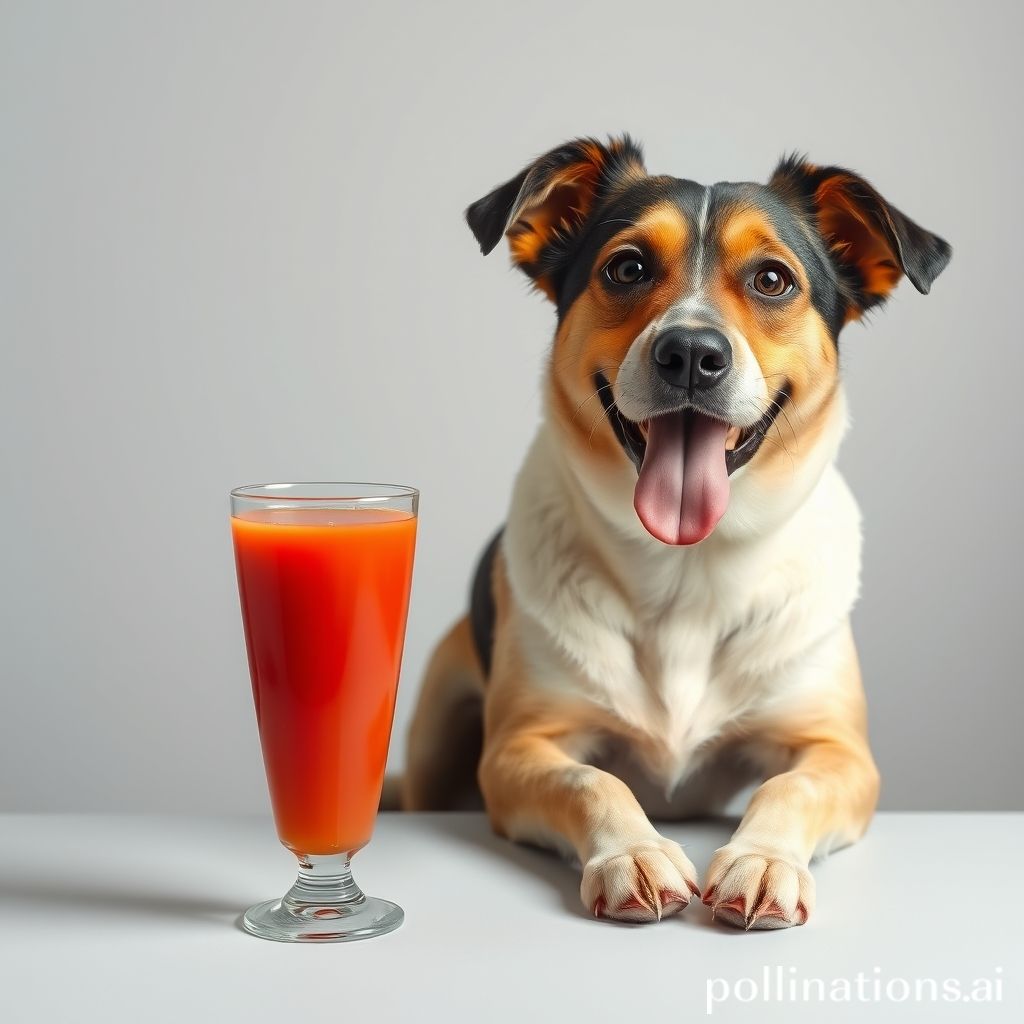Can Dogs Have Tomato Juice?
Curiosity piques when it comes to our furry companions’ diets. We carefully choose what we feed them to ensure their well-being. But have you ever wondered if dogs can have tomato juice? In this article, we’ll uncover the truth behind this tangy treat.
Discover the potential benefits and risks, and gain a clear understanding of whether tomato juice can be a part of your dog’s diet. So, let’s embark on this flavorful journey to keep our four-legged friends happy and healthy.

Table of Contents
Can Dogs Have Tomato Juice?
Safety of Tomato Juice for Dogs
Tomato juice can be safe for dogs when given in moderation and prepared properly. However, there are a few factors to consider before offering it to your furry friend.
Potential Benefits and Risks of Tomato Juice Consumption for Dogs
1. Benefits:
– Hydration: Tomato juice contains a high water content, which can help keep your dog hydrated.
– Vitamins and Minerals: It is a good source of vitamins A, C, and K, as well as potassium and folate, which can contribute to your dog’s overall health.
– Antioxidants: Tomatoes are rich in antioxidants, such as lycopene, which may have potential health benefits for dogs.
2. Risks:
– Allergies: Some dogs may be allergic to tomatoes or have sensitivities to them, leading to digestive issues or skin reactions.
– Digestive Upset: Tomato juice is acidic and may cause stomach upset, especially if your dog has a sensitive stomach or a history of gastrointestinal problems.
– Sodium Content: Store-bought tomato juice can be high in sodium, which is not suitable for dogs, especially those with certain health conditions like heart or kidney problems.
– Additives: Be cautious of any additives or seasonings in the tomato juice, such as onion or garlic powder, as these can be toxic to dogs.
It is always recommended to consult with your veterinarian before introducing any new food or beverage to your dog’s diet, including tomato juice. They can provide specific guidance based on your dog’s individual needs and health status. Remember, moderation is key, and observing your dog for any adverse reactions is crucial when offering tomato juice or any new food item.
Keep your dog hydrated with tomato juice, but watch for allergies, digestive upset, sodium, and additives.Potential Benefits of Tomato Juice for Dogs
Health Benefits of Tomato Juice for Dogs
Tomato juice offers several potential health benefits for dogs due to its rich vitamin and nutrient content.
- Vitamin C: Tomato juice is a good source of vitamin C, which can boost the immune system and protect dogs from illnesses.
- Potassium: Dogs need potassium for proper muscle and nerve function, and tomato juice provides this essential mineral.
- Lycopene: The presence of lycopene, an antioxidant compound in tomatoes, may help reduce the risk of certain cancers in dogs.
Nutrients in Tomato Juice Beneficial for Dogs
Tomato juice contains various nutrients that support a dog’s overall health and well-being.
| Nutrient | Benefits for Dogs |
|---|---|
| Vitamin A | Essential for healthy vision, immune function, and growth. |
| Vitamin K | Supports blood clotting and maintains bone health. |
| Fiber | Aids digestion and helps prevent constipation in dogs. |
| Antioxidants | Protect cells from damage and support overall health. |
Including tomato juice in a dog’s diet, under the guidance of a veterinarian, can provide these beneficial nutrients. However, it should not replace a balanced and complete dog food diet. Always consult with a veterinarian before making significant changes to your dog’s diet or introducing new foods.
In conclusion, tomato juice can offer potential health benefits for dogs due to its vitamin and nutrient content. However, it should be used as a supplement to a balanced diet and in moderation.
Risks and Concerns of Feeding Tomato Juice to Dogs
Potential Health Concerns
Tomato juice may pose certain health risks when given to dogs. It is crucial to be aware of these concerns to ensure the well-being of your furry friend.
Allergic Reactions
Some dogs may be allergic to tomatoes or develop an allergic reaction to tomato juice. Symptoms of an allergic reaction can include itching, skin irritation, swelling, or gastrointestinal distress. If your dog shows any signs of an allergic reaction, it is recommended to discontinue the use of tomato juice and consult a veterinarian.
Digestive Issues
Feeding tomato juice to dogs in excessive amounts or as a regular part of their diet can lead to digestive problems. Tomatoes are acidic and can cause stomach upset, diarrhea, or even gastric irritation. It is important to introduce tomato juice gradually and monitor your dog’s response.
Toxicity
Certain parts of the tomato plant, such as the leaves and stems, contain a substance called solanine, which can be toxic to dogs if ingested in large quantities. While the concentration of solanine in ripe tomatoes is generally low, it is still advisable to remove any green parts before offering tomato juice to your dog.
Moderation is Key
To minimize the risks associated with tomato juice, it is crucial to offer it to your dog in moderation. Tomato juice should only be given as an occasional treat and not as a substitute for a balanced diet. Consult with your veterinarian to determine the appropriate amount of tomato juice for your dog based on their size, age, and overall health.
Alternative Options
If you are concerned about the potential risks of tomato juice for your dog, there are alternative options available. Consider offering your dog other fruits or vegetables that are safe and beneficial for them, such as carrots, cucumbers, or blueberries. Always introduce new foods gradually and observe your dog’s reaction.
Conclusion
While tomato juice can be enjoyed by some dogs in moderation, it is essential to be aware of the potential risks and concerns associated with its consumption. By understanding these factors and taking necessary precautions, you can ensure the well-being and safety of your canine companion. Remember to consult with your veterinarian before making any significant changes to your dog’s diet.

Guidelines for Including Tomato Juice in a Dog’s Diet
Guidelines for Dog’s Diet |
|---|
Start with small amounts
|
Monitor for allergies or digestive issues
|
Consult with a veterinarian
|
Serve in moderation
|
Avoid additives
|
Consider homemade options
|
Observe any changes in behavior or health
|
Adjust serving size based on size and breed
|
Always prioritize your dog’s overall health
|
Exploring Alternatives to Tomato Juice for Dogs
Discover Safe and Nutritious Options for Your Furry Friend
If you’re looking for alternatives to tomato juice for your dog, there are a few options that offer similar benefits. Here are some alternatives to consider:
- 1. Carrot Juice: Carrot juice is a safe and nutritious alternative for dogs. It’s rich in vitamins and minerals, including antioxidants that support their immune system and promote healthy skin and coat.
- 2. Beet Juice: Beet juice is an excellent alternative to tomato juice. It’s packed with essential nutrients like folate, iron, and vitamin C, which contribute to your dog’s overall well-being.
- 3. Celery Juice: Celery juice helps keep your dog hydrated due to its high water content. It also contains vitamins A, C, and K, as well as antioxidants that support their immune system.
- 4. Apple Juice: Apple juice is a refreshing and safe option. It’s a good source of vitamins A and C, as well as dietary fiber, which aids digestion and promotes a healthy gut.
Include These Fruits and Vegetables in Your Dog’s Diet
In addition to juices, you can incorporate various fruits and vegetables into your dog’s diet to provide similar benefits to tomato juice:
- 1. Watermelon: Watermelon is a hydrating fruit that’s rich in vitamins A and C. It makes a delicious and refreshing treat for dogs.
- 2. Blueberries: Blueberries are packed with antioxidants, which support your dog’s immune system and promote brain health.
- 3. Spinach: Spinach is a nutrient-dense vegetable that provides essential vitamins and minerals like iron and calcium. It supports your dog’s overall health.
- 4. Pumpkin: Pumpkin is rich in fiber, aiding in digestion for dogs. It’s also a great source of vitamins A, C, and E, as well as beta-carotene.
By incorporating these alternative options, you can ensure your dog receives a varied and nutritious diet while avoiding the potential risks associated with tomato juice. Remember to introduce new foods gradually and consult with your veterinarian to determine the appropriate portions for your dog’s specific needs.
Conclusion
In conclusion, while tomato juice can offer certain benefits for dogs, it should be approached with caution. Consulting with a veterinarian is essential before introducing tomato juice into a dog’s diet, as it can pose risks such as allergies, digestive issues, and potential toxicity. It is important to follow the veterinarian’s guidelines regarding serving sizes and frequency of consumption.
Additionally, there are alternative fruits and vegetables that can provide similar benefits for dogs with specific dietary restrictions. Ultimately, prioritizing the safety and well-being of our furry friends should always be our main concern.
Faq about Dogs and Tomato Juice
FAQ 1: Can tomato juice be toxic to dogs?
No, tomato juice is not toxic to dogs. However, some dogs may have adverse reactions due to sensitivities or allergies. Introduce tomato juice gradually and monitor for discomfort or allergic reactions.
FAQ 2: How much tomato juice can I give to my dog?
The amount of tomato juice depends on your dog’s size and health. Limit tomato juice to small quantities as an occasional treat to avoid digestive upset or diarrhea.
FAQ 3: Are there specific breeds that should avoid tomato juice?
No specific breeds should avoid tomato juice altogether. However, monitor your dog’s individual reaction, especially if they are prone to digestive issues or allergies.
FAQ 4: Can tomato juice cause digestive issues in dogs?
While generally safe, excessive consumption of tomato juice can lead to digestive issues like upset stomach, diarrhea, or vomiting. Offer tomato juice in moderation and observe your dog’s response.
FAQ 5: Are there alternatives to tomato juice for dogs with dietary restrictions?
Yes, there are alternative options for dogs with dietary restrictions. Safe alternatives include vegetable broth, diluted carrot juice, or other dog-friendly fruit juices. Consult with your veterinarian for the best alternative based on your dog’s specific needs and restrictions.
